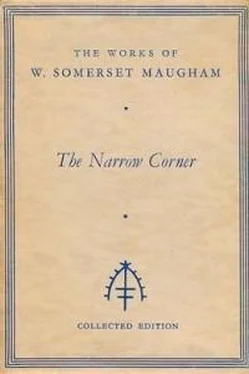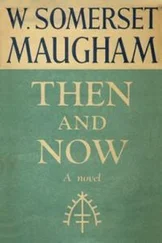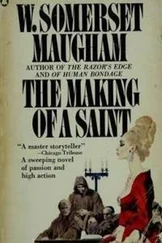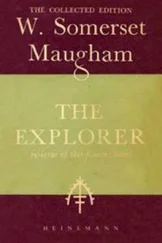But he was watchful and suspicious. He was conscious that he would have attached more significance to what Frith said had he been of ascetic appearance, and his face, instead of shining with sweat, shone with the travail of urgent thought. But does the outer man represent the man within? The face of a scholar or a saint may well mask a vulgar and a trivial soul. Socrates, with his flattened nose and protruding eyes, his thick lips and unwieldy belly, looked like Silenus, and yet was full of admirable temperance and wisdom.
Frith gave a little sigh.
“For a time I was attracted by Yoga, but after all it’s only a schismatic branch of Sankhya, and its materialism is unreasonable. All that mortification of the senses is inane. The goal is perfect knowledge of the soul’s nature, and apathy and abstraction and rigidity of posture will not enable you to attain that any more than rites and ceremonies. I’ve got masses of notes. When I have time I shall get some sort of order in my material and write a book. I’ve had it in mind for twenty years.”
“I should have thought you had time to burn here,” said the doctor dryly.
“Not enough for all I have to do. I’ve been spending the last four years doing a metrical translation of ‘The Lusiads.’ Camoens, you know. I should like to read you one or two cantos. There’s no one here who has any critical discernment. Christessen is a Dane, and I can’t trust his ear.”
“But hasn’t it been translated before?”
“Yes. By Burton, among others. Poor Burton was no poet. His version is intolerable. Every generation must retranslate the great works of the world for itself. My aim is not only to render the sense, but also to preserve the rhythm and music and lyrical quality of the original.”
“What made you think of it?”
“It’s the last of the great epics. After all, my book on the Vedanta can only hope to appeal to a small and special public. I felt I owed it to my daughter to undertake a work of more popular character. I have nothing. This estate belongs to old Swan. My translation of ‘The Lusiads’ shall be her dowry. I am going to give her every penny I make out of it. But that is not all; money isn’t very important. I want her to be proud of me; I don’t think my name will be very easily forgotten: my fame also shall be her dowry.”
Dr. Saunders kept silence. It seemed to him fantastic that this man should expect to get money and fame by translating a Portuguese poem that not a hundred people had any wish to read. He shrugged a tolerant shoulder.
“It is strange how things happen,” Frith continued, his face heavy and serious. “It’s hard for me to believe that it is only by accident that I have undertaken this task. You know, of course, that Camoens, a soldier of fortune as well as a poet, came to this island, and he must often have watched the sea from the fort as I have watched it. Why should I have come here? I was a schoolmaster. When I left Cambridge I had an opportunity to come to the East, and I jumped at it. I’d longed to ever since I was a child. But the routine of school–work was too much for me. I couldn’t bear the people I had to mix with. I was in the Malay States, and then I thought I’d try Borneo. It was no better. At last I couldn’t stand it any more. I resigned. For some time I was in an office in Calcutta. Then I started a book–shop in Singapore. But it didn’t pay. I ran a hotel in Bali, but I was before my time, and I couldn’t make both ends meet. At last I drifted down here. It’s strange that my wife should have been called Catherine, because that was the name of the only woman Camoens loved. It was for her he wrote his perfect lyrics. Of course, if there’s anything that seems to me proved beyond all doubt it’s the doctrine of transmigration which the Hindus call Samsara. Sometimes I’ve asked myself if perhaps the spark that issued from the fire and formed the spirit of Camoens is not the self–same spark that now forms mine. So often when I’m reading ‘The Lusiads’ I come across a line that I seem to remember so distinctly that I can’t believe I’m reading it for the first time. You know that Pedro de Alcaçova said that ‘The Lusiads’ had only one fault. They were not short enough to learn by heart and not long enough to have no ending.”
He gave a deprecating smile as a man might to whom an extravagant compliment was addressed.
“Ah, here’s Louise,” he said. “That looks as if supper was nearly ready.”
Dr. Saunders turned to look at her. She was wearing a sarong of green silk in which was woven an elaborate pattern in gold thread. It had a sleek and glowing splendour. It was Javanese, and such as the ladies of the Sultan’s harem at Djokjakarta wore on occasions of state. It fitted her slim body like a sheath, tight over her young nipples and tight over her narrow hips. Her bosom and her legs were bare. She wore high–heeled green shoes, and they added to her graceful stature. That ashy blond hair of hers was done high on her head, but very simply, and the sober brilliance of the green–and–golden sarong enhanced its astonishing fairness. Her beauty took the breath away. The sarong had been kept with sweet–smelling essences or she had scented herself; when she joined them they were conscious of a faint and unknown perfume. It was languorous and illusive, and it was pleasant to surmise that it was made from a secret recipe in the palace of one of the rajahs of the islands.
“What’s the meaning of this fancy dress?” asked Frith, with a smile in his pale eyes and a waggle of his long tooth.
“Erik gave me this sarong the other day. I thought it would be a good opportunity to wear it.”
She gave the Dane a friendly little smile that thanked him again.
“It’s an old one,” said Frith. “It must have cost you a small fortune, Christessen. You’ll spoil the child.”
“I got it for a bad debt. I couldn’t resist it. I know Louise likes green.”
A Malay servant brought in a great bowl of soup and set it down on the table.
“Will you take Dr. Saunders on your right, Louise, and Captain Nichols on your left?” said Frith, with a certain stateliness.
“What does she want to sit between those two old men for?” cackled the ancient Swan suddenly. “Let her sit between Erik and the kid.”
“I see no reason not to conform to the usages of polite society,” said Frith in a very dignified manner.
“Want to show off?”
“Then will you sit beside me, doctor?” said Frith, taking no notice of this. “And perhaps Captain Nichols wouldn’t mind sitting on my left.”
Old Swan, with a funny quick crawl, took what was evidently his accustomed place. Frith ladled out the soup.
“Pair of crooks they look to me,” said the little old man, shooting a sharp glance from the doctor to Nichols. “Where’d you fish ’em from, Erik?”
“You’re ginny, Mr. Swan,” said Frith, handing him gravely a plate of soup to be passed down the table.
“No offence meant,” said Mr. Swan.
“And no offence taken,” answered Captain Nichols, graciously. “I’d ever so much sooner somebody said I looked like a crook than I looked like a fool. And I’m sure the doctor’ll say the same as me. What does a fellow mean when ’e says you’re a crook? Well, ’e means you’re cleverer than ’im, that’s all; I ask you, am I right or am I wrong?”
“I know a crook when I see one,” said old Swan. “I’ve known too many in my time not to. Been a bit of a crook meself at times.”
He gave a little cackling laugh.
“And who hasn’t?” said Captain Nichols, wiping his mouth, for he ate soup somewhat untidily. “What I always say is, you must take the world as you find it. Compromise, that’s the thing. Ask anybody and they’ll tell you what made the British Empire what it is, is compromise.”
Читать дальше
Конец ознакомительного отрывка
Купить книгу










